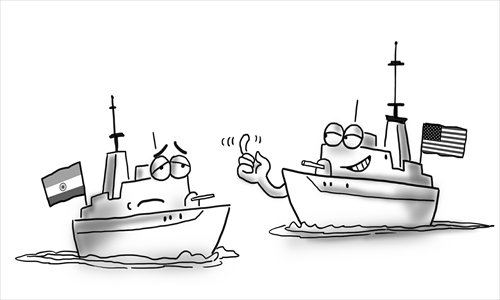S.China Sea patrols bring no benefit to India

Illustration: Liu Rui/GT
A Reuters exclusive published earlier this month suggested that the US and India had talked about launching joint naval patrols in the South China Sea in the name of safeguarding freedom of navigation. But India's Ministry of External Affairs clarified there would be no such patrols and the US subsequently denied the plan. Most opinions attribute New Delhi's refusal to its dismay over Washington's approval of the sale of F-16 fighter jets to Pakistan. However, the fact is probably that India has no intention to participate in the US-proposed South China Sea patrols, which in no way conform to its national interest.
India's interests in the South China Sea are not threatened. The country boasts close trade relations with East Asian nations; the South China Sea that harbors abundant oil and gas resources is viewed as one of its important energy sources in the future; the freedom of navigation in the waters is crucial to its interests.
Despite a close military bond with Vietnam, then Manmohan Singh administration rejected Hanoi's invitation to the Indian navy to set up a military base at Na Thrang port.
This case has fully demonstrated that the Indian government recognizes that its interests in the South China Sea are under no threat so that there is no need to build military presence in the region.
At present, freedom of navigation in the South China Sea is neither thwarted nor threatened. "Backing the freedom of navigation in the waterway" is only a pseudo-proposition. Consequently, navies of non-claimant countries of the South China Sea merely signal that they take a side and provoke China by patrolling in the waters.
Military collaboration between Washington and New Delhi has been heating up in recent years. Nonetheless, the only purpose of the latter to conduct bilateral naval patrols with the former without its interests being hurt is to meet the demand of the largest world power.
In this way, the US can include India as a "vassal state" like Japan and Australia, which will damage India's dignity and deter its pursuit to become a great power. The move will definitely encounter vehement opposition from the Indian public, triggering a severe political disaster that the Narendra Modi government could predict.
Even though New Delhi obeys Washington, it's not likely that it will see the desired return. The White House's sale of fighter planes to Pakistan provides the latest example.
India once mulled over deepening its military cooperation with the US in hope that the latter would cancel the endorsement for its perennial regional rival. But the US has its strategic needs by the sale of weapons and has never changed minds despite India's long-running objection.
India needs to develop more friends instead of making more enemies. China is the most important neighbor of India and the two have embraced booming development in their bilateral economic and trading ties over the past decade. Beijing's investment in India has enjoyed high-speed growth and Modi has been ramping up Sino-Indian economic ties since assuming office in May 2014.
For a long time, New Delhi has been viewing the confrontation caused by territorial disputes with China as the biggest security challenge, so it is indispensable to maintain harmonious bilateral military relations.
The two nations have common ground in many international hotspots. India looks to China's support in gaining a permanent membership in the UN Security Council. Conducting joint naval patrols with Washington in the South China Sea will do nothing but showing its hostility against Beijing and devastate their strategic mutual trust, which will also compel the Chinese government to adopt changes in its India policy.
In economy, politics and security, China is far more capable of making trouble for India than the reverse. The Modi government's refusal to launch the joint naval patrols shows that it has no attempt to provoke China on the one hand and that its ties with the US are not firm enough on the other.
If New Delhi chooses to follow in the US footsteps, it means the country is taking part in US "pivot to Asia" strategy and adopting a major strategic shift. This move will inevitably divide Asian nations into two camps, further giving rise to regional tensions. Nonetheless, if India takes a neutral stance that tallies with its cultural tradition, it will better realize its national interest.
The author is a research fellow at the Charhar Institute, director of the Center for Indian Studies at China West Normal University, and a visiting scholar at the Department of International Relations at the University of Colombo. opinion@globaltimes.com.cn